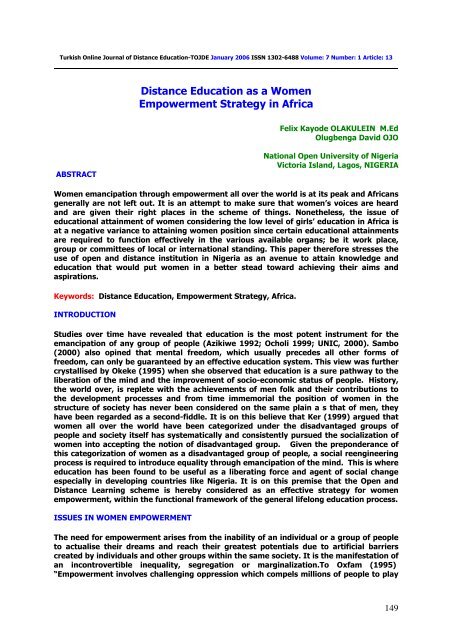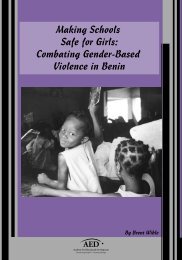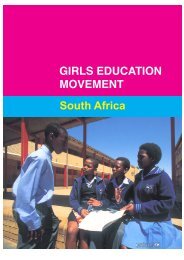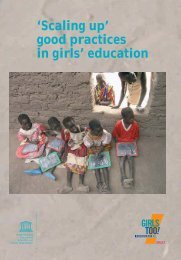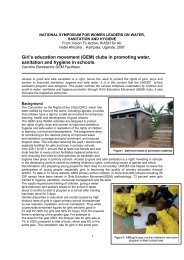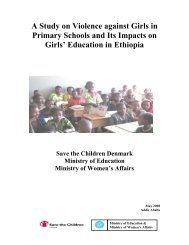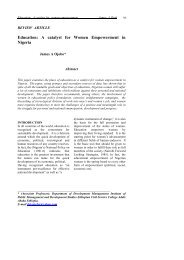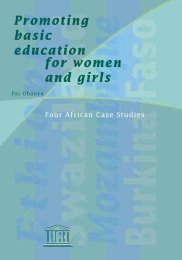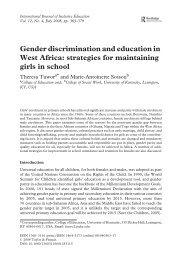Distance Education as a Women Empowerment ... - library.unesco-ii...
Distance Education as a Women Empowerment ... - library.unesco-ii...
Distance Education as a Women Empowerment ... - library.unesco-ii...
Create successful ePaper yourself
Turn your PDF publications into a flip-book with our unique Google optimized e-Paper software.
Turkish Online Journal of <strong>Distance</strong> <strong>Education</strong>-TOJDE January 2006 ISSN 1302-6488 Volume: 7 Number: 1 Article: 13<br />
<strong>Distance</strong> <strong>Education</strong> <strong>as</strong> a <strong>Women</strong><br />
<strong>Empowerment</strong> Strategy in Africa<br />
Felix Kayode OLAKULEIN M.Ed<br />
Olugbenga David OJO<br />
ABSTRACT<br />
National Open University of Nigeria<br />
Victoria Island, Lagos, NIGERIA<br />
<strong>Women</strong> emancipation through empowerment all over the world is at its peak and Africans<br />
generally are not left out. It is an attempt to make sure that women’s voices are heard<br />
and are given their right places in the scheme of things. Nonetheless, the issue of<br />
educational attainment of women considering the low level of girls’ education in Africa is<br />
at a negative variance to attaining women position since certain educational attainments<br />
are required to function effectively in the various available organs; be it work place,<br />
group or committees of local or international standing. This paper therefore stresses the<br />
use of open and distance institution in Nigeria <strong>as</strong> an avenue to attain knowledge and<br />
education that would put women in a better stead toward achieving their aims and<br />
<strong>as</strong>pirations.<br />
Keywords: <strong>Distance</strong> <strong>Education</strong>, <strong>Empowerment</strong> Strategy, Africa.<br />
INTRODUCTION<br />
Studies over time have revealed that education is the most potent instrument for the<br />
emancipation of any group of people (Azikiwe 1992; Ocholi 1999; UNIC, 2000). Sambo<br />
(2000) also opined that mental freedom, which usually precedes all other forms of<br />
freedom, can only be guaranteed by an effective education system. This view w<strong>as</strong> further<br />
crystallised by Okeke (1995) when she observed that education is a sure pathway to the<br />
liberation of the mind and the improvement of socio-economic status of people. History,<br />
the world over, is replete with the achievements of men folk and their contributions to<br />
the development processes and from time immemorial the position of women in the<br />
structure of society h<strong>as</strong> never been considered on the same plain a s that of men, they<br />
have been regarded <strong>as</strong> a second-fiddle. It is on this believe that Ker (1999) argued that<br />
women all over the world have been categorized under the disadvantaged groups of<br />
people and society itself h<strong>as</strong> systematically and consistently pursued the socialization of<br />
women into accepting the notion of disadvantaged group. Given the preponderance of<br />
this categorization of women <strong>as</strong> a disadvantaged group of people, a social reengineering<br />
process is required to introduce equality through emancipation of the mind. This is where<br />
education h<strong>as</strong> been found to be useful <strong>as</strong> a liberating force and agent of social change<br />
especially in developing countries like Nigeria. It is on this premise that the Open and<br />
<strong>Distance</strong> Learning scheme is hereby considered <strong>as</strong> an effective strategy for women<br />
empowerment, within the functional framework of the general lifelong education process.<br />
ISSUES IN WOMEN EMPOWERMENT<br />
The need for empowerment arises from the inability of an individual or a group of people<br />
to actualise their dreams and reach their greatest potentials due to artificial barriers<br />
created by individuals and other groups within the same society. It is the manifestation of<br />
an incontrovertible inequality, segregation or marginalization.To Oxfam (1995)<br />
“<strong>Empowerment</strong> involves challenging oppression which compels millions of people to play<br />
149
a part in their society on terms which are inequitable, or in ways which deny them their<br />
human rights” Okeke (1995) submitted that “to empower means to give power to, to give<br />
authority to, to enable a person or a group of persons gain power”. Batliwa (1995) in her<br />
definition of the term empowerment stated that:<br />
<strong>Empowerment</strong> is the process and the result of the process<br />
whereby the powerless or less powerful members of the<br />
society gain greater access and control over material and<br />
knowledge, resources, challenges and ideologies of<br />
discrimination and subordination and transform the<br />
institutions and structures through which unequal access<br />
and control over resources is sustained and perpetuated.<br />
The foregoing definitions show that empowerment implies that an individual or a group<br />
had hitherto lacked power or authority by circumstances, denial or default. The issue of<br />
women empowerment h<strong>as</strong> become a part of popular debate. It h<strong>as</strong> however been<br />
misconstrued in a myriad of ways; to a great majority empowerment suggests women’s<br />
power to fight men, including their husbands. The very mention of the term<br />
empowerment generates strong emotional connotations that construe violent<br />
revolutionary action of some sort or the other, organised by the women against the<br />
established institutions. Since the days of yore, the oppression of women h<strong>as</strong> been a<br />
major global dilemma and a source of concern to many international institutions like<br />
ECOWAS, UN, AU etc. The concept of empowerment b<strong>as</strong>ed on <strong>as</strong>suaging the oppressions<br />
of the women h<strong>as</strong> led to the establishment of the United Nations development Fund for<br />
<strong>Women</strong> (UNIFEM) whose primary role is to promote the participation of women at all<br />
levels of development planning and implementation. Recently in Nigeria, the federal<br />
ministry of education in conjunction with the UNICEF established a Strategy for the<br />
Acceleration of Girls’ <strong>Education</strong> in Nigeria (SAGEN). It is hoped that SAGEN will lead to a<br />
further expansion in the access of girls to education and ultimately the emancipation of<br />
women in Nigeria.<br />
PROBLEMS OF WOMEN EMPOWERMENT IN NIGERIA<br />
The issues of women have been viewed differently in social relations including economic<br />
activities. This h<strong>as</strong> formed a barrier even when democratic movements have sought to<br />
extend the b<strong>as</strong>e of participation of women. It will be fallacious to <strong>as</strong>sume that the<br />
problems of Nigerian women have been totally solved through the various emancipation<br />
initiatives (Beijing conference 1975; 1985; 1995, International decade of women,<br />
Strategy for the Acceleration of Girls <strong>Education</strong> etc) or through the collaborative efforts of<br />
the various Government and Non-governmental Organisations. Certain inequalities and<br />
segregations, which have been established over the ages and reinforced through the<br />
male-dominated structures still persist inspite of the various instruments of the United<br />
Nations and the concerted efforts of the federal government and a number of NGOs on<br />
alleviating women discrimination. Without gainsaying, illiteracy remains at the centre of<br />
women empowerment problems in Nigeria. Majority of the womenfolk and a large<br />
number of girls in this country are still grappling with the problems of b<strong>as</strong>ic reading and<br />
writing skills (Unicef 2003). The gross enrolment rate (GER 2001) indicated that<br />
71percent of out-of-school children are girls. According to ARFOL (2000) the literacy rate<br />
for males is 58 percent but only 41 percent for females. The Human Development Report<br />
2002 published by the United Nations development programme puts the statistics of<br />
illiterate women at 57 percent <strong>as</strong> against male’s 43 percent. As seemingly insignificant <strong>as</strong><br />
this difference may appear, it is completely unacceptable, if the Millennium Development<br />
Goals (MDGs) must be achieved. In Nigeria, girls and women comprise about 49.69<br />
percent (SAPA 1993) of the total population. Incidentally, about 61percent of the total<br />
female population are reported to be illiterates <strong>as</strong> against 37.7 percent illiterate male<br />
population. <strong>Women</strong> are discriminated against in access to education for social and<br />
economic re<strong>as</strong>ons. For instance, the Islamic practice of Purdah precludes many women<br />
from benefiting from school instructions and/or participating in economic activities,<br />
150
which are likely to elevate their positions. The most egregious segregation is probably<br />
the prevention of girls to go to school in some communities. This h<strong>as</strong> probably led to the<br />
greatest social harm of the twentieth century, when a whole group of females were<br />
denied access to education, on the b<strong>as</strong>is of gender differences. There is palpably a deluge<br />
of problems besetting the Nigerian women, but all of them arise from illiteracy. This<br />
suggests therefore that a large part of the empowerment process is <strong>as</strong>sociated with<br />
education of the women themselves. The root of the problem is the degree of importance<br />
women themselves have attached to education. Many of them believe that the life of a<br />
successful woman revolves around her children, her husband and domestic chores. This<br />
lack of personal ambition prevents her from thinking about pursuing other educational<br />
goals, which may have great influence on her life. In the c<strong>as</strong>e of the workingwomen in<br />
the cities, there had been a gradual predilection to abandon further training because of<br />
the demands work and family <strong>as</strong> well <strong>as</strong> the huge costs <strong>as</strong>sociated with pursuing higher<br />
studies in conventional school system or universities.<br />
THE PLACE OF EDUCATION IN WOMEN EMPOWERMENT<br />
<strong>Education</strong> according to Fafunwa (1974) refers to the sum total of experiences that a<br />
person acquires in partaking in everyday activities and how these experiences have<br />
served to make the individual a better person. Many social commentators hold the view<br />
that education is a sine qua non to any meaningful development process The impact of<br />
the level of educational attainment in any society and the corresponding level of<br />
development (in terms of the Science & Technology) is a true yardstick of this<br />
phenomenon. Maj<strong>as</strong>an (1997) had <strong>as</strong>serted that ‘Development in any society is anchored<br />
primarily to <strong>Education</strong> progresses. In a similar vein, Lockheed and Verspoor (1994) had<br />
earlier described education <strong>as</strong> a cornerstone of economic and social development.<br />
According to them, the future of the world and of individual nations hinges, more than<br />
ever before, on the capacity of individuals and countries to acquire, adapt, and advance<br />
knowledge. <strong>Education</strong> h<strong>as</strong> been viewed traditionally <strong>as</strong> a social leveller, it is the only<br />
instrument designed for piercing the social barrier that h<strong>as</strong> been created by all other<br />
structures of society. The only effective way to meaningful contribute to the emancipation<br />
of women in Nigerian Society is to widen the access of the women and girls to quality<br />
education. There is the need to take the issue of women empowerment ‘beyond mere<br />
rethorics’. It is quite e<strong>as</strong>y to canv<strong>as</strong>s for small credit loans for a few women, or negotiate<br />
a secondary political appointment for some others, just to align with the sentiments of<br />
the time. In fact, it is e<strong>as</strong>y to p<strong>as</strong>s legislations couched in very elegant language against<br />
women discriminations in all spheres of national life, but it is far e<strong>as</strong>ier and ultimately<br />
more cost effective to educate women. Creating access to quality formal education gives<br />
women a sense of belonging and their individuality will then be projected beside their<br />
husbands’.<br />
According to the UNFPA (1994) education opens the opportunity and choice for women.<br />
When women are given the requisite education, relevant to their needs and environment,<br />
they will gradually become more visible and recognised in the mainstream of activities<br />
both at home and in society at large. Given the fact that education enhances a person’s<br />
sense of self-worth, confidence and also creates an awareness of capacity, women will<br />
become more <strong>as</strong>sertive of their roles in social activities and take initiatives for themselves<br />
rather than wait for the decisions to be made for them. It can also be surmised that their<br />
income-earning potential and development will rise with the new educational status.<br />
Another crucial advantage of women education is the role it plays in reducing women<br />
fertility levels and infant mortality. It is incontrovertible to state that the family of an<br />
educated woman tend to appear healthier than that of her non-educated counterpart.<br />
DISTANCE EDUCATION AS A WOMEN EMPOWERMENT STRATEGY<br />
The social realities in contemporary times h<strong>as</strong> shown that the limitation in the access of<br />
many women to <strong>Education</strong> Opportunities which would have enhanced their<br />
151
empowerment is due chiefly to the inability of the learner and the instructor to be in faceto-face<br />
contact. There are above 880 million illiterate adults in the world (UNESCO 2002)<br />
who have been deprived access to education, because they are required to be present in<br />
the four walls of a conventional cl<strong>as</strong>sroom before they can gain access to quality<br />
education. Each day, the futility of this arrangement becomes clearer to most educational<br />
planners <strong>as</strong> the unfolding fact shows that the knowledge b<strong>as</strong>ed society of the twenty-first<br />
century demands more effective methods of dissemination of Information/Knowledge. It<br />
is obvious that due to limitations in resources; both human and financial, the traditional<br />
conventional approach of teaching in cl<strong>as</strong>srooms can no longer satisfy the snowballing<br />
population of a country like Nigeria, which h<strong>as</strong> estimated population of 120 million people<br />
(Common Country Assessment, 2001) and an average annual population growth rate of<br />
2.3% (Mabogunje 1999). Clearly a realistic alternative is long overdue, and this is what<br />
h<strong>as</strong> necessitated the introduction of the Open and <strong>Distance</strong> Learning Model otherwise<br />
referred to <strong>as</strong> <strong>Distance</strong> <strong>Education</strong>.<br />
The term Open and <strong>Distance</strong> learning reflects both the fact that all or most of teaching is<br />
conducted by someone removed in time and space from the leaner, and that the mission<br />
aims to include greater dimensions of openness and flexibility, whether in terms of<br />
access, curriculum or other elements of structure. The desire to anchor <strong>as</strong> much <strong>as</strong><br />
possible to the train of globalization demands that all sectors of society must be literate<br />
and this kind of m<strong>as</strong>s education can only be afforded through the distance-learning<br />
scheme. Jegede (2003) observed that all nations of the world desirous of a cost-effective,<br />
convenient, conducive, efficient and comprehensive way to educate all its citizens have<br />
embraced Open and <strong>Distance</strong> learning’. The concept of open and distance education is a<br />
scheme that affords a nation the opportunity to effectively transmit educational benefits<br />
to all its citizens cheaply and more effectively, especially those hitherto unreached or<br />
denied access on the b<strong>as</strong>is of one social consideration or the other. Nigeria women<br />
undoubtedly fall within this category and this system of education affords them the<br />
opportunity to pursue the gift of knowledge without contradicting any societal dictates.<br />
The uniqueness of distance education <strong>as</strong> a women empowerment strategy can be gleaned<br />
from the fact that it straddles so many facets of the social system.<br />
First to be considered are the cl<strong>as</strong>s of women who are full time house wives, many of who<br />
have never had access to formal education or had to give up school at early stages of<br />
their lives. <strong>Women</strong> in this group are not usually enthusi<strong>as</strong>tic about formal education<br />
because their husbands had indicated that they are to sit at home and take care of the<br />
home and the children. Such women are usually unable to leave their spouse and<br />
children to travel away to a conventional university system. The challenges posed by this<br />
social system is far reaching, in the sense that the woman cannot venture out of the home<br />
to a formal school system where she can pursue the much craved training, skills<br />
development and education. Many of them have to be contented with seeing their dreams<br />
come alive in their children’s lives and they unconsciously transfer their dreams to their<br />
children’s lives. <strong>Women</strong> in this category will definitely be grateful for distance education,<br />
since it allows them to sit at home and study for a programme without jeopardising their<br />
marriages or abandon their children. It is certainly a means of fulfilling the life dreams of<br />
many a woman who have been saddled with the function of a full time housewife. The<br />
issue of women education is essential for rural development and women are not well<br />
equipped to contribute their useful quota to the society <strong>as</strong> a result of illiteracy (Azikiwe<br />
1992)<br />
Another group of women, whose position is only slightly different from the previous<br />
group, are those women who have been denied the access to formal training provided by<br />
schools and colleges because of their obedience to the Islamic practice of Purdah. These<br />
women can still have access to qualitative education through the open and distance<br />
learning approach that allows them to pursue their education at a ‘safe distance’ from the<br />
instructors. They can study, turn in <strong>as</strong>signments and write examinations after adequate<br />
arrangements have been made. A woman in purdah can be trained and given the<br />
opportunity to contribute her own quota to national development without disobeying any<br />
152
of the injunctions of her religion. <strong>Distance</strong> education is an alternative that affords this<br />
group of women access to quality study materials on any field of their choice without any<br />
of the barriers <strong>as</strong>sociated with the conventional system and her religious dedication.<br />
A third group, which h<strong>as</strong>, for long been suffering in silence are the workingwomen. The<br />
plight of the workingwomen h<strong>as</strong> been that of an unrecognised and unremunerated<br />
labour. In Nigeria, workingwomen tend to live unfulfilled lives, having their dreams<br />
aborted prematurely. After a college degree, a workingwoman finds herself in marriage<br />
and the demand of childbirth makes her postpone going back to school a little longer. By<br />
the time her l<strong>as</strong>t child will be out of primary school, she finds that the first is already<br />
grappling with the challenges of prepubescent years. Her family of creation and her<br />
family of procreation places so much social demands on her and her husband’s family are<br />
not relentless in their demands. All these family duties make the workingwoman<br />
postpone furthering her education one more time. As the years roll by she finds that it is<br />
becoming incre<strong>as</strong>ingly difficult to actualise the dream of going back to school. The socioeconomic<br />
factors against the family of a typical workingwoman in Nigeria today are<br />
multifarious. Society prefers that only the husband pursue further educational<br />
improvement while the funds available should be spent on taking care of the children.<br />
This of course is never to the best advantage of the workingwoman but she h<strong>as</strong> to<br />
continue to suffer in silence. The open and distance learning mode of education is the<br />
sure answer to the prayers of many working women in Nigeria who could not abandon<br />
their families and their work to pursue better educational qualifications which will<br />
enhance their career progression. It allows them to pursue qualitative education that will<br />
improve on their sense of self-esteem in the estimation of their family friends and<br />
husbands. These can be achieved without jeopardising either the important family<br />
relationship or the relatively responsible position in her place of work that she h<strong>as</strong><br />
worked so hard to create.<br />
The itinerant nomadic women are yet another group of women who could benefit<br />
immensely from this radical approach to instructional processes. The social dictates and<br />
the vocational practices of women in these nomadic societies require that they be always<br />
constantly on the move with there families. Their subsistence is b<strong>as</strong>ed solely on this<br />
means and the educational pursuit is secondary, if at all it exists, to subsistence. For<br />
generations, women in these societies have been denied access to quality education of<br />
whatever form due the peripatetic nature of their livelihood. <strong>Women</strong> in this category can<br />
benefit from the open and distance learning model if they are properly sensitised about<br />
the advantages that education holds for their lives their subsistence and their families.<br />
Introducing the ODL scheme, which does not take them out of their social environments,<br />
yet seeks to deliver qualitative education about their social environment and other<br />
societies can then reinforce this.<br />
CONCLUSION<br />
In the final analysis, there seems to be no end to the palpable advantages of the distance<br />
learning system. The fore going shows that the functional implications and advantages of<br />
the scheme cover a broad spectrum of society such that everyone and anyone can benefit<br />
at no great a cost. While the focus of this work are primarily the women, the distance<br />
learning system holds great advantages for the entire society, almost anyone can benefit<br />
from this unique system of education. The system however holds special implication for<br />
the women, especially in a developing society such <strong>as</strong> Nigeria. Lots of market women,<br />
traders, itinerant businesswomen, women in Purdah, working women <strong>as</strong> well <strong>as</strong> women<br />
and girls resident in the sub-rural societies could benefit from this scheme. Another<br />
implication of the study is that it would go along way in incre<strong>as</strong>ing on the literacy level of<br />
Nigerians generally and the women especially. This observation confirms the <strong>as</strong>sertion of<br />
Okeke (1995) that education is the most effective strategy for promoting women<br />
empowerment and the United Nations report on human development which states that in<br />
sub-saharan Africa education seems to be the only effective means of empowering<br />
women. The influence of quality education in these societies have been much discussed, it<br />
153
is a poverty reduction scheme, it can be used to sensitize women about family planning<br />
issues, HIV/AIDS issues, issues relating to peace and governance within their societies,<br />
primary health maternal and infant mortality <strong>as</strong> well <strong>as</strong> environmentally sustainable<br />
practices.<br />
BIODATA AND CONTACT ADDRESSES of AUTHORS<br />
Felix Kayode Olakulehin h<strong>as</strong> M<strong>as</strong>ters Degree in <strong>Education</strong>al Administration and<br />
Management from University of Ibadan, Nigeria. He is in the School of Business and<br />
Human Resources of the National Open University of Nigeria. He is currently running a<br />
programme on scholarship with IGNOU.<br />
Felix Kayode Olakulehin M.Ed<br />
National Open University of Nigeria<br />
14/16 Ahmadu Bello Way, Victoria Island<br />
Lagos, NIGERIA<br />
Email: felixkayman@yahoo.co.uk<br />
Olugbenga David Ojo (Ph.D) h<strong>as</strong> his Degrees in <strong>Education</strong>al Guidance and Counselling<br />
Psychology from University of Ilorin, Nigeria and Obafemi Awolowo University, Ile-Ife<br />
Nigeria respectively. He is in the Examinations Unit of the National Open University of<br />
Nigeria. He h<strong>as</strong> published extensively in his area of specialisation.<br />
Olugbenga David Ojo<br />
National Open University of Nigeria<br />
14/16 Ahmadu Bello Way, Victoria Island<br />
Lagos, NIGERIA<br />
Email: gbenga_ojo2001@yahoo.com<br />
REFERENCES<br />
Emunemu B.O. & Ayeni O.A.(2003) “The Social benefits of Educating Girls and <strong>Women</strong> in<br />
Nigeria”. In Babalola J.B et al (Eds) Contemporary Issues in Management Ibadan Dept. of<br />
Ed. Mgt.UI pp. 137-150.<br />
Fawole T. (2002) African Leadership and <strong>Women</strong> Challenges. Ibadan. Pelc<strong>as</strong>.<br />
FME/UNICEF (1993) B<strong>as</strong>ic <strong>Education</strong> Statistics an Trends in Nigeria. Lagos: Federal<br />
Republic of Nigeria.<br />
FME/UNICEF (2003) Strategy for the Acceleration of Girls’ <strong>Education</strong> in Nigeria. Abuja.<br />
Federal Republic of Nigeria.<br />
Jegede O.J.(2003) Taking the <strong>Distance</strong> Out of Higher <strong>Education</strong> in 21 st Century Nigeria. An<br />
invited Convocation Lecture Presented at the Federal Polytechnic, Oko, Anambra State<br />
Maj<strong>as</strong>an J.A. (1997) Qualitative <strong>Education</strong> and National Development. Ibadan. Spectrum.<br />
Okeke E.A.C.(1995) “<strong>Women</strong> <strong>Empowerment</strong> and Rural Developmen”. in E .C. Eboh, C. U.<br />
Okoye & D Ayichi (Eds) Rural Development in Nigeria: Concepts, Processes and Prospects.<br />
Enugu. Auto-Century pp.152-163.<br />
UNESCO (2002) Open and <strong>Distance</strong> Learning: Trends, Policy and Strategy Considerations.<br />
Paris. UNESCO.<br />
154


